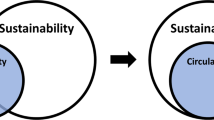Abstract
Research continues on the design of products that do not create serious problems for sustainable development and natural ecosystems. What should be considered in the design to minimize harmful consequences in the product’s entire lifespan, such as the manufacturing process, during use, and after the end of its life?
Heating and cooking methods, which have been used in traditional Korean houses for more than 1,000 years, are observed in terms of TRIZ’s resource analysis, systematic thinking, and functional analysis, and the characteristics found in them are summarized. It extracts the characteristics of the concept of a circular economy by analyzing its technological system properties, interactions of constructs, invention principles, and resource properties over time. Ondol systems are highly recyclable, with most of the components that make up the system from a circular environment perspective being reused as a cycle of resources.
Thus, these features demonstrate the importance of predicting and analyzing the interactions of each configuration over time as an extension of system thinking in the early stages of planning a technical system, in the resource analysis and utilization of the components that make up the system in conceptual design.
Access this chapter
Tax calculation will be finalised at checkout
Purchases are for personal use only
Similar content being viewed by others
References
Korhonen, J., Honkasalo, A., Seppälä, J.: Circular economy: the concept and its limitations. Ecol. Econ. 143, 37–46 (2018)
Morseletto, P.: Targets for a circular economy. Resour. Conserv. Recycl. 153, 104553 (2020)
A European Strategy for Plastics in a Circular Economy 2018. European Commission (2018)
Greenpeace Plastics Report (2019)
The Evaluation and Application of the TRIZ Method for Increasing Eco-Innovative Levels in SMEs (2017)
Russo, D., Spreafico, C.: TRIZ-based guidelines for eco-improvement. Sustainability 12(8), 3412 (2020)
Lee, S.G.: Sustainable development and technology development. Bull. Korea Environ. Preserv. Assoc. 14(8), 2–3 (1992)
Kuo, T.C., Huang, S.H., Zhang, H.C.: Design for manufacture and design for ‘X’: concepts, applications, and perspectives. Comput. Ind. Eng. 41(3), 241–260 (2001)
Dombrowski, U., Schmidt, S., Schmidtchen, K.: Analysis and integration of design for X approaches in lean design as basis for a lifecycle optimized product design. Procedia CIRP 15, 385–390 (2014)
Climatological Normals of Korea (1981–2010), Korea Meteorological Administration Seoul, Republic of Korea (2011)
The Federation of Korea Culture Center. https://ncms.nculture.org/house/story/6602
Park, J.J., Lee, K.H.: Numerical analysis for thermal characteristic in traditional Gudul. In: The Society of Air-conditioning and Refrigerating Engineers of Korea, pp. 107–107 (2005)
Rhee, S.H., Rhee, G.H.: Analysis for thermal transfer in traditional ondol (gudle). In: Proceedings of the Korean Society for Agricultural Machinery Conference, vol. 11, no. 2, pp. 213–216 (2006)
Sustainability Report, Hanwha Solutions Chemical Division (2015)
Joan, M.F., Mendoza, M.S., Alejandro, G.-S., Graeme, H., Adisa, A.: Integrating backcasting and eco-design for the circular economy: the BECE framework. J. Industr. Ecol. (2017)
Rhee, S.H., Rhee, G.H.: Heat flow characteristics of traditional ondol (gudle) by numerical analysis. Korean Soc. Agric. Mach. 49(1), 17–22 (2007)
Buzuku, S., Shnai, I.: A systematic literature review of TRIZ used in eco-design. J. Eur. TRIZ Assoc. 02–2017(04) (2018)
Kim, J.Y.: A study on the development of guideline and application for sustainable design. Korea Polytechnic University (2011)
Hong, H.G., Kim, S.H.: Method and analysis of dynamic simulation for ondol heating. Korean J. Air-Conditioning Refrigeration Eng. 22(6), 375–382 (2010)
Chun, C.H.: The other 90%, warm technology, and the best solution: a critique of the appropriate technology movement in South Korea. J. Sci. Technol. Stud. 14(2), 127–164 (2014)
Winner, L.: The Whale and the Reactor: A Search for Limits in an Age of High Technology. University of Chicago Press, Chicago (1986)
Chun, S.U.: A Mountain House Cookbook (1459). https://if-blog.tistory.com/724
Chung, J.-N.: A change of awareness on the ondol system and architectural seeking for increasing heating efficiency since the 18th century Joseon society. J. Arch. Hist. 27(3), 15–26 (2018)
Mun, J.N.: Thermal storage ondol gudle with duplex structure. KR Patent, No. 10-1374432 (2014)
Author information
Authors and Affiliations
Editor information
Editors and Affiliations
Rights and permissions
Copyright information
© 2021 IFIP International Federation for Information Processing
About this paper
Cite this paper
Cho, S. (2021). Concept Design of Appropriate Technology Based on Circular Economy for Sustainable Development Inferred from Korea Traditional Heating System. In: Borgianni, Y., Brad, S., Cavallucci, D., Livotov, P. (eds) Creative Solutions for a Sustainable Development. TFC 2021. IFIP Advances in Information and Communication Technology, vol 635. Springer, Cham. https://doi.org/10.1007/978-3-030-86614-3_6
Download citation
DOI: https://doi.org/10.1007/978-3-030-86614-3_6
Published:
Publisher Name: Springer, Cham
Print ISBN: 978-3-030-86613-6
Online ISBN: 978-3-030-86614-3
eBook Packages: Computer ScienceComputer Science (R0)





